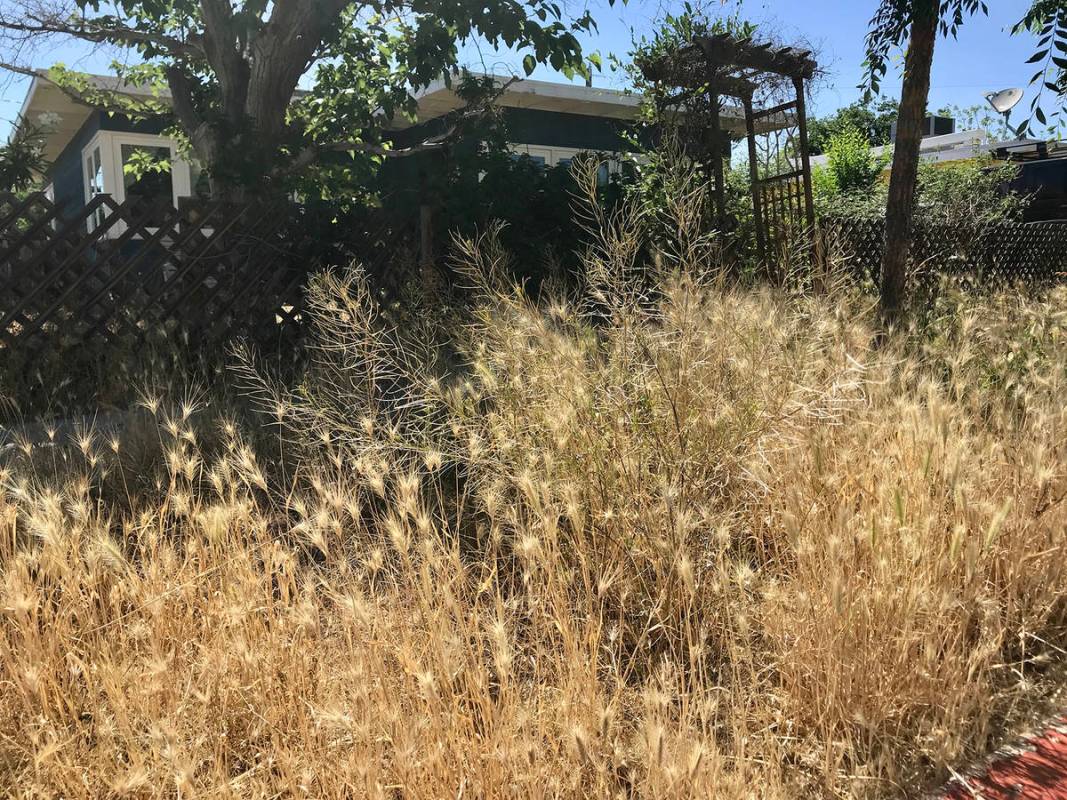
Our stay-at-home order has inspired people to find ways to keep active while maintaining social distancing. As a result, folks are “taking it to the streets” and walking, myself included.
Walking brings us an up-close view of our neighborhoods, but alas, it has also revealed a “plant-demic.” Weeds are rampant in yards, alleys and sidewalks.
Keegan Littrell, public works director who oversees the landscape division, helped explain the current proliferation of weeds and how weeds are contagious, if you will.
“This year, we’ve had weather conditions that have favored weed growth. Once you get some weeds in one location, our robust winds tend to carry weeds to other yards, parks, etc.”
Not simply an eyesore, weeds are harmful. Weeds outcompete nonweed plants for space, water, sunlight, soil and nutrients, which can render good plants vulnerable to disease, insect infestation and drought.
Allergy and asthma sufferers should be weed wary as many species trigger respiratory issues. Weed pollen lowers air quality and bolsters desert dust. A big nuisance is the nasty sandbur with its sharp spike balls that stick to us and our pets like mini medieval torture devices.
Weeds can offer some benefits, but all things considered, they need to go.
Grumbling over the overgrowth, I feared nothing could be done. I thought if homeowners enjoyed 2-foot-tall weed prairies in their front yard, by golly, that’s their business. Happily, I was wrong.
Boulder City Code has multiple weed ordinances, for instance: “Health and sanitation, public nuisance 8-1-2-C-8: Neglected or improperly maintained landscaping constituting a fire hazard, danger to public safety or welfare. This shall include dead, debris laden, weed infested and/or overgrown vegetation …”
“Boulder City codes help our community maintain our reputation of being a wonderful place to work and live. Oftentimes, people are busy and don’t realize they’ve fallen behind in yard maintenance. Most residents comply immediately once they are made aware of the concern,” said City Manager Al Noyola.
Becoming “aware of the concern” is something with which Pat Richardson of code enforcement is well-familiar.
“Our most common complaints this time of year are overgrown grass, dying vegetation and weed growth, especially in homeowners’ yards. It tends to affect the quality of life and property values in our neighborhoods,” states Richardson. “Our community volunteers monitor properties to make sure homeowners take action early, before neighbors contact City Hall.”
He explains that residents can report issues using the SeeClickFix app or by going to www.bcnv.org/concerns to use SeeClickFix online; either can be used anonymously.
While being a weed tattletale may not seem neighborly, neither is letting your yard look like an African grassland.
“Getting rid of weeds in your yard doesn’t just beautify your home, but it also is part of being a good neighbor and stopping the weeds from spreading,” Littrell said.
Killing weeds is tricky, especially when the go-to herbicide, Roundup, is advertised as carcinogenic and worthy of lawsuits. Its ingredient, glyphosate, has been classified by the World Health Organization’s International Agency for Research on Cancer as”probably carcinogenic in humans.”
Here are my top five ways to stomp out weeds:
Boiling water: Scalding weed leaves will kill them. Use a teakettle to pour a just-boiled stream of water over the weed head. It may take multiple times to get to the roots.
Vinegar and citrus oil: This 20 percent vinegar must be used with protective gear because it can burn you. Mix a ratio of 1 gallon 20 percent vinegar to 1 cup citrus oil and spray it on weeds on a sunny, not windy day. Be careful not to overspray onto wanted plants/grass.
Flame weeding: A flame weeder setup uses a wand connected to a propane tank. Read instructions thoroughly before using. Know that the goal is to heat the weed, not burn it. It won’t kill the root but repeated exposure will stunt it.
Weed pulling: Pull weeds from the base when the ground is wet. Use a helpful tool like a Warren hoe, using its triangular head to get to the root.
Mulch: A 2-3-inch layer of mulch will deter weed seeds from taking root, and small existing weeds will die with lack of sunlight.
Norma Vally is a seasoned veteran of home improvement; her career includes four seasons as host of Discovery Home Channel’s Emmy-nominated series “Toolbelt Diva.” A columnist and author, Vally splits her time in Southern Nevada, Los Angeles and New York City. Follow her on Facebook at Norma Vally “Toolbelt Diva” and visit her at www.NormaVally.com. Email Norma@NormaVally.com.